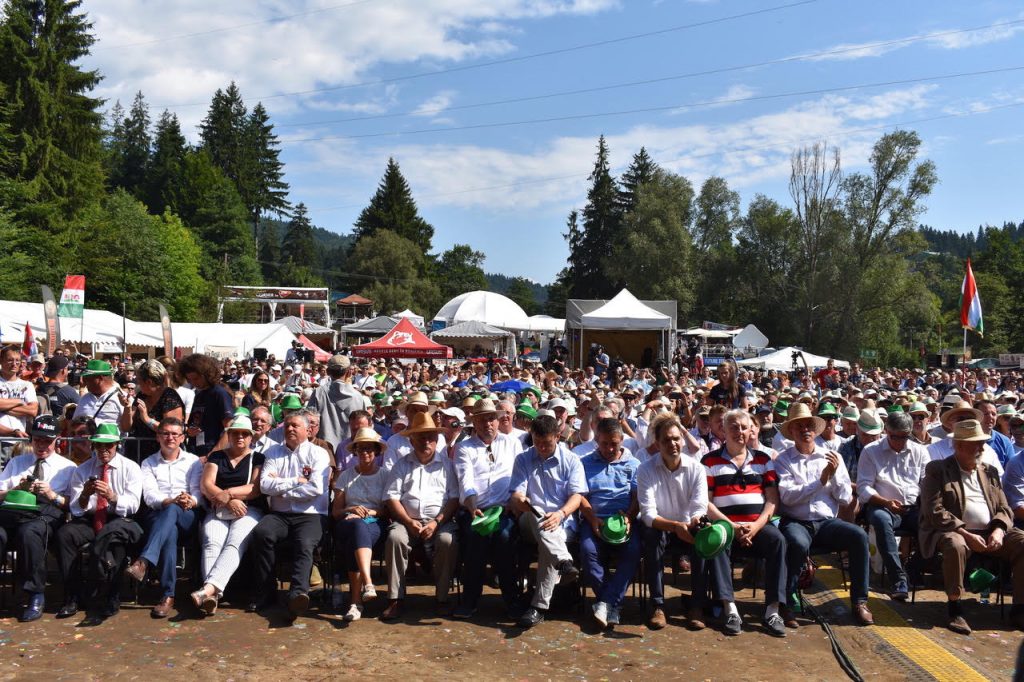Very difficult years are coming for the European economy and the Hungarian government will prepare the country to weather them, Prime Minister Orbán said at the Tusnádfürdő/Băile Tușnad summer camp in Transylvania on Saturday.
“Difficult times are coming, and the question is not whether these are indeed coming, but exactly how difficult they will be. My personal opinion is that these will be very difficult times,” Orbán said. He added that if the Hungarian government’s predictions are accurate, in addition to the economy-boosting program adopted this spring, two more will have to be implemented next spring and next autumn.
The summer camp – first held in 1990 based on an idea of then BBC journalist David Campanale – has since come to the respectable age of 30 and has grown as big as the venue itself would allow. In its first seven years it was held in the spa resort Bálványosfürdő and moved thereafter to the nearby spa of Tusnádfürdő, the smallest town by population (1,617) in Romania. Hence the name Tusványos, a combination of the names of the two settlements (Bálványosfürdő has no permanent population and is administratively part of the village of Torja/Turia).

Audience listens to Hungarian Prime Minister Viktor Orbán’s speech at the Tusnádfürdő summer camp in Transylvania (TransylvaniaNOW, István Fekete)
While it now includes a plethora of concerts and other recreational activities, it was conceived as a discussion venue and testing ground of political ideas, and has essentially maintained that focus. Current Hungarian Prime Minister Viktor Orbán has been a regular since the beginning and his speeches – traditionally held on Saturdays – are the center of attention.
Orbán also spoke about the new leadership of the European Union, saying that its composition was also the result of Hungarian diplomacy.
“We managed to prevent having ‘ideological guerillas’ in key leadership positions of the European Union,” Orban said, adding that “the European Commission is not a political body, its role is not to set a political agenda,” a task that must be left to the European Council, the body consisting of the heads of state and government of the member nations.
He also said that Europe must continue to defend itself from migration but this task – as opposed to the economic problems ahead – was a relatively simple one and the solution was the establishment of a council of the member states’ ministers of interior, which must be given full authority in all migration-related issues.
Orbán also said that Hungary will have “very difficult battles with regard to the rule of law” with the European Union, adding that it was quite ironic that Hungary will have to fight against a Finland (the current holder of the rotating presidency of the EU), which itself has no constitutional court and its judges are appointed by the president based on the justice minister’s proposals.
Orbán went on to explain in detail the concept of illiberal democracy, which he introduced at this same venue back in 2014. He said that in contrast to liberal democracies, which are just a collection of individuals who only form a political nation, in the illiberal or national view, a nation is historically and culturally defined and individual performances must primarily be judged by their contribution to the common good.
“The goal of illiberal politics is Christian liberty,” Orbán said. His entire 50-minute speech was in Hungarian, but he also repeated “Christian liberty” in English.
Title image: Hungarian Prime Minister Viktor Orbán speaks at the Tusnádfürdő summer camp in Transylvania (TransylvaniaNOW, István Fekete)